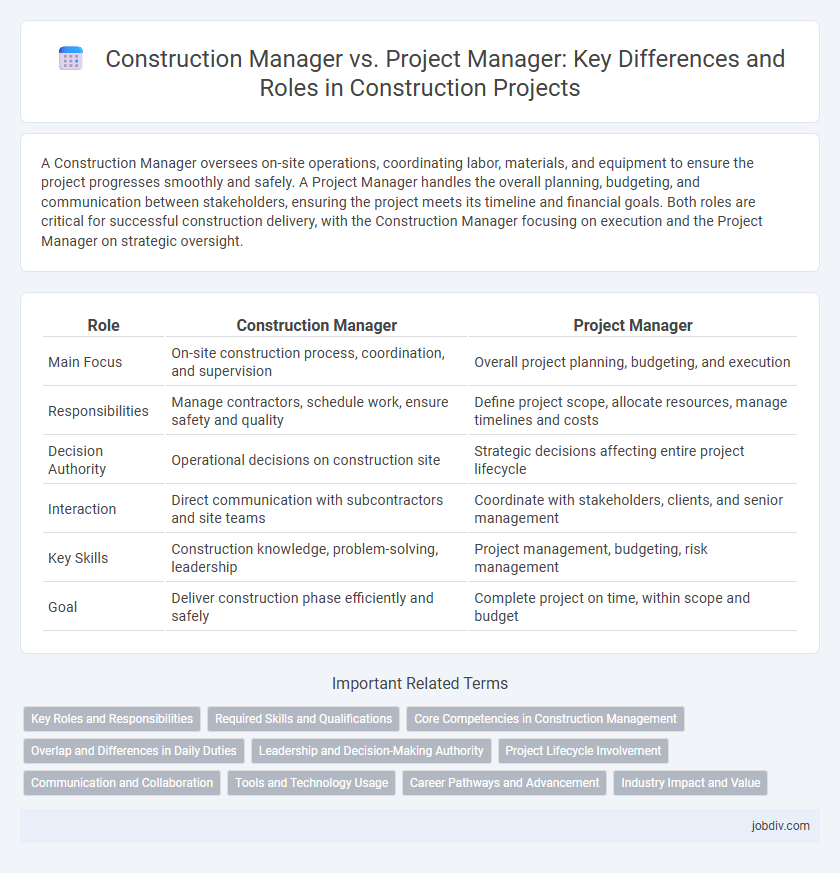A Construction Manager oversees on-site operations, coordinating labor, materials, and equipment to ensure the project progresses smoothly and safely. A Project Manager handles the overall planning, budgeting, and communication between stakeholders, ensuring the project meets its timeline and financial goals. Both roles are critical for successful construction delivery, with the Construction Manager focusing on execution and the Project Manager on strategic oversight.
Table of Comparison
| Role | Construction Manager | Project Manager |
|---|---|---|
| Main Focus | On-site construction process, coordination, and supervision | Overall project planning, budgeting, and execution |
| Responsibilities | Manage contractors, schedule work, ensure safety and quality | Define project scope, allocate resources, manage timelines and costs |
| Decision Authority | Operational decisions on construction site | Strategic decisions affecting entire project lifecycle |
| Interaction | Direct communication with subcontractors and site teams | Coordinate with stakeholders, clients, and senior management |
| Key Skills | Construction knowledge, problem-solving, leadership | Project management, budgeting, risk management |
| Goal | Deliver construction phase efficiently and safely | Complete project on time, within scope and budget |
Key Roles and Responsibilities
Construction Managers oversee on-site operations, coordinate subcontractors, manage schedules, and ensure compliance with safety standards. Project Managers focus on overall project planning, budgeting, client communication, and risk management to deliver the project within scope, time, and cost constraints. Both roles require strong leadership and collaboration skills but differ in their primary focus areas: site execution versus project lifecycle management.
Required Skills and Qualifications
Construction Managers require expertise in construction methods, safety regulations, and resource management, often holding degrees in construction management or civil engineering alongside certifications like PMP or OSHA safety training. Project Managers need strong skills in budgeting, scheduling, risk management, and stakeholder communication, typically possessing project management certifications such as PMP or PRINCE2 and experience with project management software. Both roles benefit from leadership, problem-solving, and organizational abilities but differ in their focus on on-site execution versus overall project coordination and delivery.
Core Competencies in Construction Management
Construction Managers excel in site supervision, resource allocation, and compliance with safety regulations, ensuring efficient workflow and adherence to building codes. Project Managers specialize in strategic planning, budget control, stakeholder communication, and risk management to deliver projects on time and within scope. Both roles require strong leadership, problem-solving skills, and expertise in construction technology to optimize project outcomes.
Overlap and Differences in Daily Duties
Construction managers and project managers both oversee project execution but differ in scope and focus; construction managers primarily handle on-site supervision, resource allocation, and safety compliance, while project managers coordinate overall project planning, budgeting, and stakeholder communication. Overlap occurs in task scheduling, quality control, and team leadership, ensuring project milestones meet deadlines and standards. Distinct daily duties include construction managers managing subcontractors and site logistics, whereas project managers prioritize contract management, risk assessment, and client reporting.
Leadership and Decision-Making Authority
Construction Managers lead on-site teams, ensuring daily tasks align with project specifications and safety standards, exercising direct control over construction activities. Project Managers hold broader decision-making authority, overseeing project planning, budgeting, and coordination among contractors, clients, and stakeholders, driving overall project success. Strong leadership in Construction Managers focuses on operational execution, while Project Managers emphasize strategic management and resource allocation.
Project Lifecycle Involvement
Construction managers typically focus on the on-site execution phase of the project lifecycle, ensuring that construction activities align with design specifications and safety standards. Project managers oversee the entire project lifecycle from initiation and planning through execution, monitoring, and closure, coordinating resources, budgets, and stakeholder communication. Their broader involvement includes risk management and schedule adherence across all phases, making them responsible for overall project delivery.
Communication and Collaboration
Construction Managers excel in on-site communication, coordinating directly with contractors and subcontractors to ensure project specifications are met efficiently. Project Managers prioritize stakeholder collaboration, facilitating communication between clients, engineers, and architects to align project goals and timelines. Effective construction project delivery relies on the seamless integration of both roles' communication and collaboration strengths.
Tools and Technology Usage
Construction managers leverage advanced Building Information Modeling (BIM) software and leadership platforms to coordinate on-site activities efficiently, whereas project managers prioritize project scheduling tools like Microsoft Project and Primavera P6 for timeline management and resource allocation. Both roles rely heavily on cloud-based collaboration tools such as Procore and PlanGrid to streamline communication and document sharing across teams. Integration of drones, IoT sensors, and AI-driven analytics enhances real-time monitoring for construction managers, while project managers focus on utilizing data visualization tools to assess project progress and risks.
Career Pathways and Advancement
Construction Managers typically advance from roles such as site supervisor or foreman, developing expertise in on-site operations, safety protocols, and resource management. Project Managers often begin their careers in engineering, architecture, or project coordination, focusing on budgeting, scheduling, and client communication to oversee projects from inception to completion. Both career paths offer progression to senior management roles, with Construction Managers moving toward director of construction positions and Project Managers advancing into executive roles like program director or portfolio manager.
Industry Impact and Value
Construction managers drive on-site operations, ensuring timely resource allocation and adherence to safety standards, which directly impacts project quality and cost efficiency. Project managers oversee the broader project lifecycle, coordinating stakeholders, budget management, and strategic planning to align construction outcomes with business objectives. Their combined leadership fosters industry innovation, improving productivity and delivering substantial value through enhanced collaboration and risk mitigation.
Construction Manager vs Project Manager Infographic

 jobdiv.com
jobdiv.com